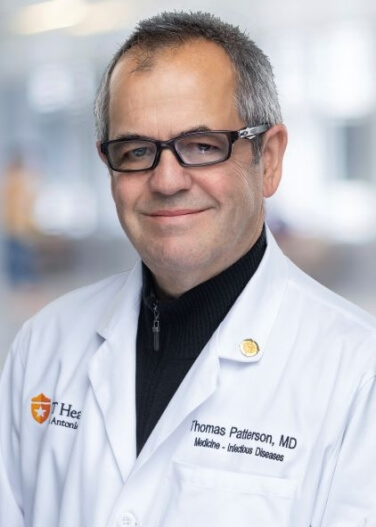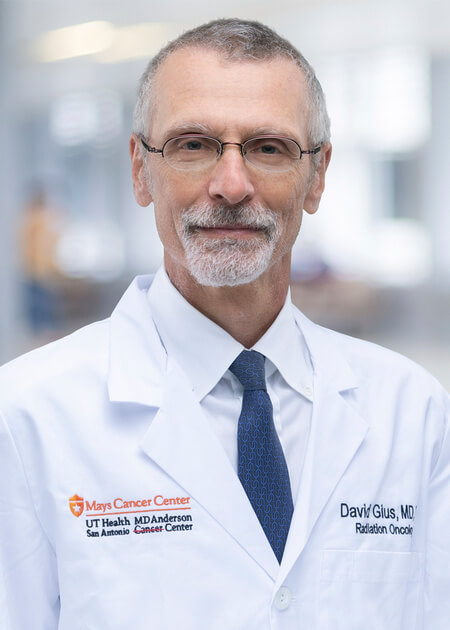Exclusive scientific organization honors outstanding physician-scientists.
Thomas Patterson, MD, and David Gius, MD, PhD, two top physician-scientists at The University of Texas Health Science Center at San Antonio (UT Health San Antonio), have been accepted into the prestigious Association of American Physicians for the advancement of scientific and practical medicine.
Patterson is professor of medicine and chief of the Division of Infectious Diseases and vice chair for clinical research for the Department of Medicine in the Joe R. and Teresa Lozano Long School of Medicine, and Gius is associate cancer director of translational research at the Mays Cancer Center and assistant dean of research and professor of radiation oncology in the Long School of Medicine.
Election to the AAP is an honor extended to physicians with outstanding credentials in basic or translational biomedical research and is limited to only 70 persons per year. Patterson and Gius will be recognized during the AAP annual meeting at a dinner in Chicago on April 6.
“This is a significant recognition as the AAP is one of the country’s oldest and most prestigious physician-scientist honor societies,” said Robert A. Hromas, MD, FACP, dean of the Long School of Medicine and vice president for medical affairs at UT Health San Antonio, who along with school President William L. Henrich, MD, FACP, nominated Patterson and Gius.
“Dr. Patterson is a distinguished leader in the study, diagnosis and treatment of fungal diseases, particularly in immunocompromised hosts, and Dr. Gius is preeminent in research of the relationship between aging, mitochondrial bioenergetics and breast cancer,” Hromas said. “We join in congratulating them both on this richly deserved honor.”

With his extensive experience in the study of opportunistic fungal infections, Patterson has been involved in developing new antifungal drugs and in clinical trials of new antifungal compounds. He also is director of the San Antonio Center for Medical Mycology.
He has published and lectured widely on fungal infections and was an early founder and co-editor-in-chief of the popular mycology website DoctorFungus (www.drfungus.org). During the COVID-19 pandemic, Patterson led the UT Health San Antonio Division of Infectious Diseases’ efforts in clinical management of COVID-19 care and was the institution’s principal investigator for the Adaptive COVID-19 Treatment Trial (ACTT) conducted at University Hospital, supported by the National Institutes of Health to develop safe and effective therapies against COVID-19.
He is a principal investigator for the RECOVER study to combat Long COVID. He is a fellow of the American College of Physicians and past president of the Texas Infectious Disease Society and the International Immunocompromised Host Society.
He received his Bachelor of Arts degree from Baylor University and his medical degree from McGovern Medical School in Houston. He completed his internship and residency at Vanderbilt University Medical School and at Yale-New Haven Hospital, and a fellowship in infectious diseases at Yale University School of Medicine, where he also served as an assistant professor of medicine.

Gius was recruited in 2020 to UT Health San Antonio from the Robert H. Lurie Comprehensive Cancer Center at Northwestern University with a grant award by the Cancer Prevention and Research Institute of Texas. The following year, he earned a $1.6 million UT System Faculty STARs award to support his research on aging and breast cancer.
Gius graduated from the University of Illinois with a Bachelor of Science degree in chemistry, finished his PhD thesis work from the University of Chicago and graduated from Loyola Medical School. He completed an internship year at the University of Michigan and a radiation oncology residency at Washington University School of Medicine, the Mallinckrodt Institute of Radiology.
He was an assistant professor at Washington University for four years and then accepted a position as the chief of the Molecular Radiation Oncology Section at the National Cancer Institute in the Radiation Oncology Branch that lasted nine years.
At Northwestern, he was the Zell Family Scholar Professor and director of the Women’s Cancer Research Program at the Lurie Comprehensive Cancer Center, and vice chairman of the Translation Research Department of Radiation Oncology and Pharmacology at the Feinberg School of Medicine.
AAP is an honorary medical society founded in 1885 by the Canadian physician Sir William Osler and six other distinguished physicians of his era for “the advancement of scientific and practical medicine.” The organization includes more than 1,800 active members and 750 emeritus and honorary members. The great majority are U.S. citizens though other countries also are represented.
The overarching goals of the AAP include the promotion of professional and social interaction among biomedical scientists, the dissemination of important information related to biomedical science and teaching, the recognition of outstanding, diverse physician-scientists through membership and the establishment of role models to kindle new generations of high achievers in medicine and medical science.


